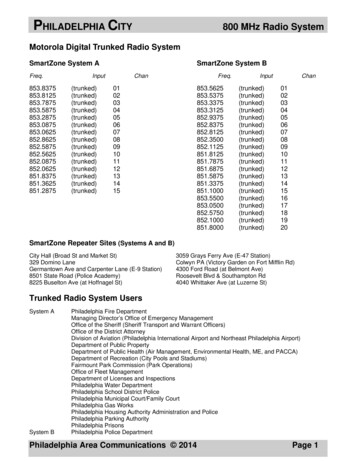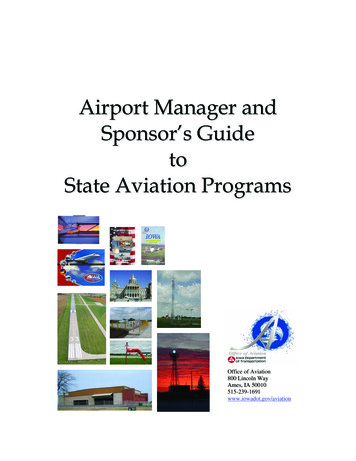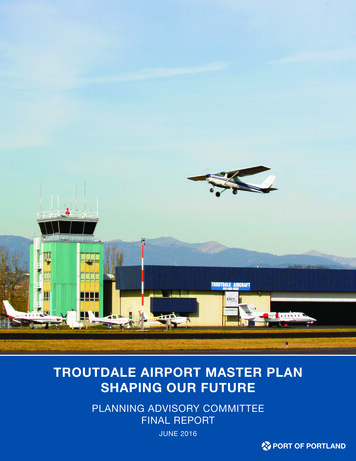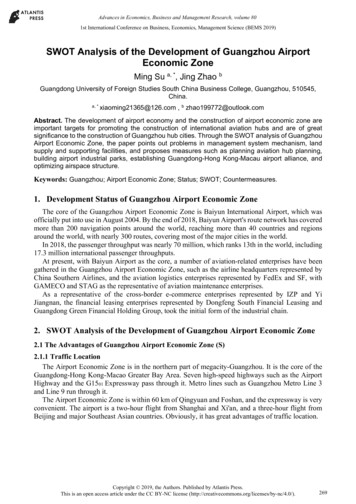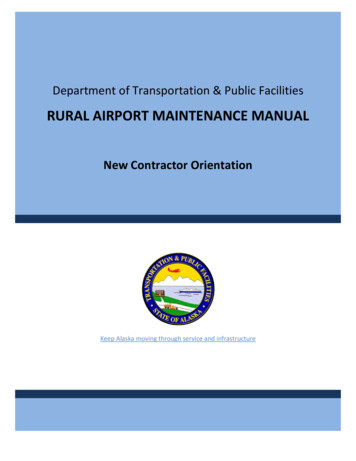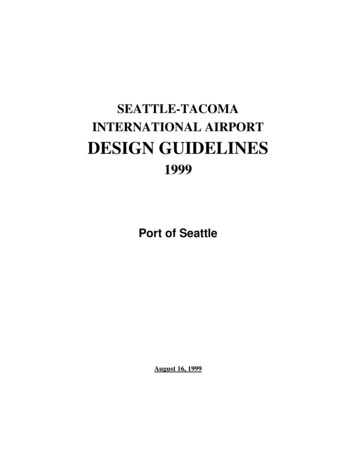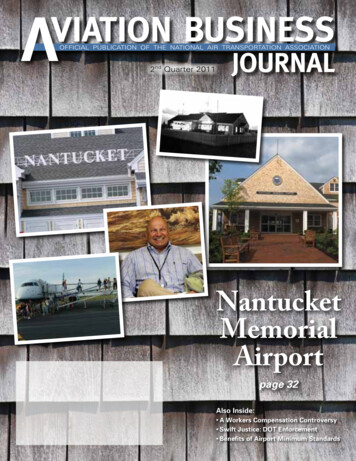
Transcription
OFFICIAL PUBLICATION OF THE NATIONAL AIR TRANSPORTATION ASSOCIATION2nd Quarter 2011NantucketMemorialAirportpage 32Also Inside: AWorkers Compensation Controversy Swift Justice: DOT Enforcement Benefits of Airport Minimum Standards
GET IT ALL AT AVFUELAll Aviation Fuels / Contrac t Fuel / Pilot Incentive ProgramsFuel Qualit y Assurance / Refueling Equipment / Aviation InsuranceF u e l S t o r a g e S y s t e m s / F l i g h t P l a n n i n g a n d Tr i p S u p p o r tG loba l S uppl ier of Aviation Fuel and S er vices800.521.4106 w w w.avfuel.com facebook .com/avfuel t witter.com/AVFUELt weeter
First.Best.Only.NetJets pioneered the concept of fractional jet ownership in 1986 andbecame a Berkshire Hathaway company in 1998. And to this day, we aredriven to be the best in the business without compromise. It’s why oursafety standards are so exacting, our global infrastructure is so extensive,and our service is so sophisticated. When it comes to the best in privateaviation, discerning fliers know there’s Only NetJets .SHARE LEASE CARD ON ACCOUNT MANAGEMENT1.877.JET.0139 NETJETS.COMA Berkshire Hathaway companyAll fractional aircraft offered by NetJets in the United States are managed and operated by NetJets Aviation, Inc. Executive Jet Management, Inc. provides management servicesfor customers with aircraft that are not fractionally owned, and provides charter air transportation services using select aircraft from its managed fleet. Marquis Jet Partners, Inc.sells the Marquis Jet Card . Marquis Jet Card flights are operated by NetJets Aviation under its 14 CFR Part 135 Air Carrier Certificate. Each of these companies is a wholly ownedsubsidiary of NetJets Inc. 2011 NetJets Inc. All rights reserved. NetJets, Executive Jet, Marquis Jet, and Marquis Jet Card are registered service marks.
There’s NoSUCH THINGAs RoutineFLIGHT SUPPORTLower your airstairs at any of our 100 plus worldwide locations and you’llimmediately notice our warm, personal greeting. It’s the first item in ourSignature Service Promise. Followed up with safe, ramp-ready handling,inviting facilities, personal attention to passengers and crew and availableQuickTurn service. Add to that our always fair, competitive pricing, andTMyou’ll want to make Signature a permanent part of your flight plan.Find specific information about individual locations at SignatureFlight.com.
AviationBusinessJournalOfficial Publication of theNational Air Transportation AssociationChairpersonJames MillerPresidentJames K. CoyneVice ChairpersonTodd DuncanTreasurerCharles CoxNextantCleveland, OHDuncan Aviation - LincolnLincoln, NENATAAlexandria, VANorthern Air, Inc.Grand Rapids, MIImmediate Past ChairKurt F. SuttererRobert “Buddy”StallingsAlfred G. PetersonEastern Aviation Fuels, Inc.New Bern, NCNantucket MemorialAirportNantucket, MABob MarinaceMark WilleyBridgeford Flying ServiceNapa, CAJames P. SweeneyAnn PollardPublisherJames K. CoyneContributing EditorsMaryanne ArthurEditorShannon ChambersEditorial DirectorEric R. ByerThe Anatomy of Aviation Insurance 11By Jim GardnerA common practice for many FBOs has been to classify theircustomer service representatives who work behind the counterin the FBO lobby as clerical employees. Some of these FBOshave been doing this for years without any comment or exception from their workers compensation insurance company. However, an onsite audit from the NCCI could reveal some surprises.19By Lindsey C. McFarrenBoard of DirectorsFargo Jet CenterFargo, NDNantucket Memorial AirportBy: Shane C McClellan, Captain of s/v Guiding Light (www.svGuidingLight.com).Swift Justice: DOT EnforcementSS Consulting, LLCColumbia, ILKey AirOxford, CT2nd Quarter 2011Issue 2 Volume 9Shoreline Aviation, Inc.Marshfield, MAwww.justwritesolutions.comDaniel B. Gurley IIIAmy HornadayLinda PylantArt Direction/DesignLaurel Prucha MoranBlue Room Designwww.blueroomstudio.comAdvertising SalesMarshall BoomerThe YGS GroupAdvertisingFor advertising information, call 800.501.9571 x123 oremail marshall.boomer@theYGSgroup.com4226 King Street Alexandria, VA 22302800/808-6282 Fax 703/845-8176www.nata.aeroRunning afoul of Department of Transportation rules can be painful,especially for “non-operators” in the aviation industry, such as brokers, ticket agents, and others. Find out what lessons can be learnedfrom prior enforcement proceedings and how businesses can avoidattracting the attention of the “swift justice” Enforcement Office.Island Crossroads32By Paul Seidenman & David J. SpanovichWhen passengers arrive at Nantucket Memorial Airport (ACK),it’s unlikely they know they have landed at the second busiestairport in Massachusetts — after Boston Logan International.In fact, during the island’s high tourist season summer months,as many as 1,000 daily operations have been recorded at theairport, which traces its lineage to a grass strip, laid out on afarmer’s field in 1919, and known then as Nobadeer Airport.During the past seven years under Al Peterson’s management,ACK has undergone a continuous process of major facility upgrades for both air carrier and general aviation passengers.President’s MessageInside Washington7By James K. Coyne9By Eric R. ByerCharter Summit to Raise Funds for Wounded Warriors25Benefits of Airport Minimum Standards40By Colin BanePLST Buzz47Advertiser Index49DISCLAIMERThe information in this publication is general in nature, is prepared strictly for informational purposes, and is notintended to serve as legal, accounting, financial, insurance, investment advisory, aviation operation or safety, or otherprofessional advice as to any reader’s particular situation. Readers are encouraged to consult with competent legal,financial, insurance, investment advisory, aviation, and/or other professional advisors concerning specific mattersbefore making any decisions. Statements of fact and opinion are the responsibility of the authors alone and do not implyany opinion on the part of the officers, employees, and/or members of NATA. Publication of any advertisement in thismagazine is not an endorsement of the vendors or advertisers nor of the products advertised.COPYRIGHT & TRADEMARK NOTICE 2011. National Air Transportation Association, Inc. All rights reserved. All articles, stories, and other content (including but not limited to text, graphics, layout, and design) (the “Content”) of this magazine are the intellectual property ofNATA and/or of its licensors and are protected by United States copyright, trademark, and other intellectual propertylaws. No Content may be copied, modified, published, broadcast or otherwise distributed without the prior writtenpermission of NATA or the licensor of such Content.“NATA” and “NATIONAL AIR TRANSPORTATION ASSOCIATION” are registered trademarks of NATA.“AVIATION BUSINESS JOURNAL” are trademarks of NATA.
SBNSCKSDFSJCSKFSMOSNASUNSWFTEBTULTUSUES
President’s MessageIs Plane Power Partof your Plan?By James K. CoyneIn almost 40 years of flying,I’ve visited over 1,000 FBOsand, as we all know, no twoare alike. The physical differences are always apparent, butbeneath the surface you can usuallydetect much more important variations in the fundamentals of theirbusiness models. Simply put, the successful FBOs just seem to have moreenergy!I recently visited a good friend witha beautiful FBO in North Dakota andmarveled, as always, at his continuing success. Every time I stop by, itseems, there is some new initiativehe’s taking to find new customers,new lines of business, or new waysto build support for his airport fromstate, federal, and local policymakers. Of course, this may just be due tosome special ingredient in the waterof the Red River Valley — after allNorth Dakota has the lowest unemployment rate of any state in theUnion, but I think it has more to dowith the energetic example that thecompany’s president sets for everyonein his organization.Unfortunately, you can also findelegant FBOs that feel like they’rejust beautiful palaces that have beenfrozen in amber. The smiles are allAviation Business Journal 2nd Quarter 2011in the proper places and the fuel isproperly pumped, but it still seemslike everyone is just waiting, standing at their duty stations just in casea customer shows up. One wondersif their business plans include anyproactive initiatives at all.As America struggles to recoverfrom a prolonged stagnation, this maybe a good time for each of us to askhow we can put more power into ourbusiness plans, especially as some ofour competitors, e.g. the legacy airlines, seem oblivious to any concernsabout “connecting” with their customers. Too often, it seems, we fall intothe “commodity trap” and supposethat what we sell is nothing more thanan unglamorous gallon of fuel. Are wedestined to become, like gas stationsalong the roadside, little more thaninterruptions in a customer’s busylife? Isn’t it better to show every clientthe power of our industry and howit can add power to their own lives,their livelihoods, and their lifestyles?I’m reminded of a businessinitiative developed by various BellTelephone companies back in thedays of their vast telecommunicationsoligopoly. They could easily have justsat around waiting for customers topick up the phone and pump penniesinto their treasuries, but instead theydeveloped a program called “PhonePower” that proactively sought outbusiness users who perhaps didn’t appreciate how valuable a business toolthe telephone could be. I attended a‘Phone Power for Small Businesses’seminar back in 1971 and, as a result,developed a small telemarketingprogram that helped ring up some important sales for my little business. Ifthe telephone company can overcometheir “commodity trap,” so can you.Every business in those days“knew” about the telephone, justas everyone today “knows” whatairplanes are, but few of them fullyunderstood how significant the vasttelephone network really could beto their business. Similarly, I submit, most businesses today haven’tlearned how valuable the network ofprivate aviation can be. Isn’t it ourjob to teach them? Isn’t it time fora “Plane Power” program at yourairport?I estimate that less than 5% ofthe businesses in most communities know how to use plane power.The obvious candidates, those withnational and regional offices or broadContinued on page 87
President’s MessageContinued from page 7sales or distribution networks, have surely gotten the message, but what about everyone else? They think that privateaviation is just an alternative to the airlines or long drivesin an automobile. We’ve got to show them that it is much,much more. Simply put, private aviation may be the singlemost powerful tool they can find to expand their businessand increase profits.Airport management should play a part in this, too.Perhaps your FBO and the airport could jointly support aprogram of regular Plane Power seminars, custom-craftedfor the leaders of the most ambitious businesses and otherenterprises in your community, where the true value of aneffective private aviation program, either with managed orchartered aircraft, can be persuasively presented. Privateaircraft can be part of an unbeatable sales and promotioncampaign for almost any business. They can help a businesscement important supplier relationships. They can incentivize staff and increase the effectiveness of critical employees.They can open new markets, dissuade competition, entertainprospects, connect with policymakers, and energize wholecompanies. In fact, the real power of an airplane is its almostmagical ability to empower the senior management of virtually any company, giving them more time to win the nextbattle even as it provides a powerful horse to carry equallypowerful leaders into the fray itself. Can this, by any measure, merely be compared to an airline ticket?Of course, some FBOs will sit back and wait for others togrow the market, assuming that a rising tide will eventuallylift all vessels. Promoting private aviation is someone else’sjob, they will say, as they wait for plane manufacturers orfractional providers to sell aircraft and shares, eventuallybringing new customers to their hangars and ramp — theyhope. In today’s market, a smarter plan may be to plug intotomorrow’s new customers on your own terms.Your FBO is unique and you will inevitably have your ownstrategies about finding new customers. My advice is simple:Energize your whole company, your airport, and your entirenetwork of friends, colleagues, and employees to find thatnext customer. Don’t wait for him to find you.Raise Your Voice,Get InvolvedAs the Voice of Aviation Business,NATA’s focus is to protect theinterests of aviation businessesthrough aggressive and professionalrepresentation. To get involved, call(800) 808-6282 or visit www.nata.aero.PS: If you do put together a local Plane Power programand need a passionate participant, give me a call. I’ll bemore than happy to help.8Aviation Business Journal 2nd Quarter 2011
Inside WashingtonNATA 2011By Eric R. ByerAs we approach the 2011 NATA Air CharterSummit that will take place on June 6-8 inChantilly, Virginia, I am reminded about all thatis going on concerning the Part 135 community.From flight and rest requirement interpretations to the continuing struggle to coalesce around one auditstandard for the Part 135 industry and to illegal charter operations that continue to raise the ire of the industry and the FAAalike, there is no shortage of issues to discuss at this year’ssummit. The association has taken into consideration manyof these important issues and built an outstanding programfor them to be discussed in June. Session highlights of thisyear’s program include: FAA Regulatory ReviewJohn Allen, Director, Flight Standards Services, FederalAviation AdministrationMost Frequently Issued FAA Part 135 ViolationsJoe Conte, Office of the Chief Counsel, EnforcementDivision, Federal Aviation AdministrationPaul Lange, Law Offices of Paul A. Lange Open Forum with the FAA Part 135 BranchJohn Duncan, Manager, Air Carrier Division (AFS-200),Federal Aviation AdministrationSteve Kane, Manager, Part 135 Operations Branch (AFS250), Federal Aviation AdministrationTim Beglau, Aviation Safety Inspector, Part 135 OperationsBranch, Federal Aviation Administration Transportation Security Administration UpdateBrian Delauter, General Manager, General Aviation,Transportation Sector Network Management,Transportation Security AdministrationAviation Business Journal 2nd Quarter 2011 Twelve-Five Standard Security Program Session(TFSSP Operators Only)Transportation Security Administration TFSSP PrincipalSecurity Supervisors will review the latest program updatesand address operator questions.Alleviating Part 135 Audit ConfusionAs the Part 135 community becomes saturated with a variety of audits for operators, learn more about the variousaudit standards and what the future holds for the on-demand air charter industry.Bankruptcy Has Its ClawbacksDuring the last few years’ difficult economy, several brokers and charter operators have failed. To the surprise ofmany operators, payments made in the final days of thatbusiness, including payments for charter flights, can sometimes be reclaimed during bankruptcy proceedings. Theseso-called clawbacks are authorized in the bankruptcy lawsand are intended to ensure that all of the failed company’sdebtors have a fair shot at any remaining assets. How canyou protect your business if a customer’s business fails andyou’re asked to give back tens of thousands of dollars? Canyou fight a clawback? What are your rights during theseproceedings? Find out the answers to these questions andmore during this informative briefing.Charter Broker Guidance SessionDayton Lehman, Deputy Assistant General Counsel,Office of Aviation Enforcement and Proceedings, U.S.Department of TransportationKent S. Jackson, Partner, Jackson & Wade, LLCDon’t miss the 2011 NATA Air Charter Summit. Itpromises to address some of the most important issues affecting the Part 135 and 91k communities while bringing togetherthe best and brightest within these industries.To learn more about the 2011 NATA Air Charter Summit, visitwww.nata.aero/acs. I look forward to seeing you in June!9
The Anatomy of Aviation Insurance A Workers Compensation Controversy for FBOsABy Jim Gardnercommon practice formany FBOs has been toclassify their customerservice representativeswho work behind thecounter in the FBO lobby as clericalemployees if, for no other reason,than this was a logical choice giventhe work environment of the employee. Some of these FBOs havebeen doing this for years without anycomment or exception from theirworkers compensation insurancecompany. However, an onsite auditfrom the NCCI could reveal somesurprises. (The National Council onCompensation Insurance — NCCI —publishes the NCCI Scopes Manualwhich most states accept as the standard for employee classification).Aviation operators have threebasic class codes assigned by theNCCI to an aviation operation:8810 – Clerical Office Employee;7403 – Aviation Airport or HeliportOperator, and 7422 – AviationAircraft or Helicopter Operator.To better understand employeeclassification for an FBO, I solicitedclarification and discussion on the8810 and 7403 class codes from several workers compensation underwriters with whom I work. Here areour findings:8810 — Clerical OfficeEmployeesThis classification applies toemployees engaged exclusively inbookkeeping, record keeping, correspondence, or other office workwhere books and records are keptor correspondence is conducted. Itapplies only to employees who workin areas physically separated fromother operations and perform clericalduties exclusively. Rule 1-B-2 definesphysical separation as by floors, walls,partitions, counters, or other similarbarriers. The definition of clericaloffice does not include areas whereinventory is kept; where productsare displayed for sale; or where acustomer brings products from otherareas for purchase.Code 8810 includes depositing offunds at a bank; pick up or drop off ofmail at a post office; purchasing officesupplies; or delivering of paychecks toemployees, but only if the employeequalifies as a clerical office employeeand such duties are related to theirwork.Important note: If an employeehas any other duty, the total payrollof that employee shall be assignedto the highest rated classification towhich their work pertains.If a classification phraseologyincludes “& Clerical,” then employeesqualifying as clerical office employeesare included in that classification andthey are not assigned to code 8810. Itmakes no difference whether the clerical office employees are at a separatelocation or at the same location wherethe other operations are conducted.If classification phraseologyincludes “All Employees,” or similarterminology, but does not include “&Clerical,” employees qualifying forContinued on 13Aviation Business Journal 2nd Quarter 201111
Anatomy of Aviation InsuranceContinued from page 11assignment as clerical office employees are assigned to code8810.”Important note: If a business is described by code8810 any operation (employee) not qualifying as a clerical office operation is assigned to the basic classificationthat describes that operation.It is clear and logical to most of us in the aviation industrythat the clerical class code could apply to customer servicerepresentatives and other office type workers in FBOs. Theproblem, however, is twofold. First, if an auditor choosesto strictly apply the definition of a Clerical Office Employeeto an FBO Customer Service Employee, then the 8810 classcode will likely not apply. Second, the only place left to placethe employee in an Aviation risk category is that of a 7403— Aviation Airport or Heliport Operator, which is the basicclassification that describes that operation.The insurance rate for an8810 clerical worker is aslow as 36 cents per 100 inclerical payroll while the ratefor a 7403 can be 4.00 ormore per 100 of payroll.This speaks for itself.7403 Aviation — Airport or Heliport Operator —All Other Employees & DriversConsider the definition and contemplate operations of the7403 class code.“This classification applies to employees of airport orheliport operators involved with the service, maintenance,and repair of aircraft and hangar and terminal buildings,customer service employees such as information or ticketclerks and baggage handlers, and security personnel.Service or maintenance of aircraft includes refueling,cleaning, de-icing, and performing routine maintenance ofAviation Business Journal 2nd Quarter 2011the aircraft’s systems. Maintenance of buildings or groundsincludes cleaning bathrooms, washing windows, cleaningand waxing floors, vacuuming, servicing HVAC equipment,and shoveling sidewalks and snowplowing runways. Alsoincluded is the maintenance of vehicles used at the airport.”The problem here is that the definition is so broad thatit applies to employees who clearly have a large diversityin workplace risk. If the auditor decides that a customerservice representative works in a terminal environmentthen that employee is disqualified as a clerical employeeregardless of what the job/risk of injury logically entails.Regardless of the classification, a customer service representative who spends 100% of his/her time behind an FBOcounter doing clerical duties does not have the same risk ofinjury, degree of injury, or frequency of injury as a ramp service worker, aircraft refueler, or aircraft mechanic. Maybenot even as much exposure as the auditor themselves.There is also a big financial discrepancy. The insurance rate for an 8810 clerical worker is as low as 36 centsper 100 in clerical payroll while the rate for a 7403 can be 4.00 or more per 100 of payroll. This speaks for itself.The bottom line is that there is a huge gap in real riskand classification of some aviation workers with no clearrecourse readily available except to appeal the NCCI rulingto the state Insurance Commissioner. In my mind, to strictlyapply the definition of an 8810 to customer service representatives without a reasonable alternative is unjust andfinancially punishing to a business that already is experiencing extreme financial hardships.Historically, the NCCI has been very reluctant to makechanges in classifications codes. Unless the evidence hasbeen overwhelming, challenges to the NCCI classificationshave not been very successful. Economically, the insurancecompanies don’t appear to have much incentive to work fora change. Even so, FBOs in Georgia recently got a favorable ruling from the Georgia Insurance Commissioner. InDecember 2010 an NCCI Circular announced a revision tothe Basic Manual Classification for the Georgia aviation classification code 7403. The new classification code definitionstates:“ Ticket sellers and information clerks awayfrom airport locations are to be separately ratedas Code 8810. Individuals at the airport locationthat provide customer service, including but notContinued on 1513
FltPlan.com.The Pilot’s ToolkitAll of the tools you need to plan andmanage flights are in one place.Over 100,000 pilots created 4.8 million flightplans using FltPlan.com in 2010. With ourreliable and easy-to-use tools, FltPlan.comfiles more IFR flight plans than the private andgovernment services combined.Flight PlanningFBO & Airport InfoFlight TrackingFltPlan.com continues to be the industrystandard among professional pilots with ourongoing new enhancements. So don’t wastetime and resources using more than oneservice, when you can do it all at FltPlan.com.FAA-ApprovedWeatherRunway AnalysiseAPISCONGRATULATIONS to all of this year’s winners! See the results at www.FltPlan.com.SMS
Anatomy of Aviation InsuranceAVIATION & AIRPORT LAW PRACTICEContinued from page 13limited to, telephone duties, reservations, andbilling are to be separately rated as Code 8810. Iftheir duties include tagging luggage and baggagecheck-in or if they are exposed to the operativehazards, the Code 7403 is assigned.”This ruling has already been applied to one FBO inGeorgia after a 2010 audit was disputed. Originally theinsurance company auditor applied the strict definition ofthe 8810 class code moving all of their “behind the counter”CSRs from the 8810 to the 7403 category which resulted ina large audit premium due. The FBO with the aid of theirinsurance broker disputed the audit. With the cooperationof the underwriter an independent audit was requested.The NCCI auditor conducting the dispute audit saw that theCSRs workspace was enclosed by the counters with clear entry and exit ways. In addition, these CSRs did not go out onthe ramp or other operational areas. In the past, the NCCIhad ruled that because the CSRs worked in a “terminal area”rather than a cubicle or enclosed office, they were precludedfrom being classified as an 8810 and therefore were defaulted to the 7403 category. In light of the new ruling andwith the agreement of the insurance company, the originalaudit was reversed.While this is a very important change, it only applies toGeorgia. It does not address the difference in workplacehazards of a CSR who occasionally walks out on a staticramp to deliver a note or welcome VIPs and the ramp servicelineman whose everyday job is working on a dynamic ramp.Through special training for CSRs, such as NATA’s Safety1st Program and other risk management measures, you maybe able to mitigate the risk of injury to a CSR who occasionally goes out on the ramp. It isn’t a final solution, but it mayhelp prevent an accident or injury and keep your experiencemodifier low.Long term, the classification issue would require a commitment by the NCCI and insurance underwriters to spreadthe Georgia 8810 ruling to other states as well as provideanother, more realistic classification such as the “outsidesales” category to the aviation operators.Our multi-state law offices represent FBOs, Ground Handlers,Fuelers, Part 121, Part 91 and Part 135 operators on a wide rangeof aviation matters, including acquisitions, day to day legal matters,contracts and leases, Part 13 and 16 complaints, insurance defenseand enforcement matters, as well as, commercial litigation.OUR TEAM OF SEASONED ATTORNEYS HAS THEEXPERTISE YOU NEED.Call today to arrange a consultation with theAVIATION AND AIRPORT LAW PRACTICE GROUP:PH: (516) 364-1095 FAX: (516) 364-0612lkirsch@mklawnyc.com www.mklawnyc.comJim Gardner is a retired US Air Force officer and professionalpilot. He currently works as an aviation insurance specialtybroker with JSL Aviation Insurance in the Atlanta, GA area. VisitJim’s personal website at www.JimGardnerAviationInsurance.com for other articles and information on aviation insurance.Aviation Business Journal 2nd Quarter 201115
NATA Spring Training WeekThe 2011 NATA Spring Training Week at theCygnus Aviation Expo in Las Vegas startedstrong on February 21 with increased attendanceand finished full steam with positive participantresponse. The 2011 lineup included NATA’s LineService Supervisor Training, Environmental Compliance andSafety 1st Trainer seminars. From top-notch training andquality speakers to friendly competition and a fun locale,NATA Spring Training Week had something for everyone.NATA Director of Safety and Training Amy Koranda said,“We applaud our members for sending a record number ofline service personnel to attend the NATA Spring TrainingWeek Line Service Supervisor Training (LSST), Safety 1stTrainer and Environmental Compliance seminars. Therewere ample opportunities for supervisors and managers to16learn something new and receive a great reminder of howvital their job is and that it must be done judiciously.”Each seminar featured talented speakers who came toshare their unique expertise and industry experience andwere well received by the participants.“Given the large number of positive evaluations andenthusiastic attendee remarks, investing in safety training at Spring Training Week is an excellent choice,” addedKoranda. (See Safety 1st article on Spring Training seminarson page 51.)On the morning of February 24, Koranda, Jim Balloughof JBallough Global Aviation Solutions, and transportationsafety consultant John Goglia led a lively panel discussionon Safety Management Systems (SMS) today and providedinformation on free SMS resources, several of which can beAviation Business Journal 2nd Quarter 2011
Breaks Recordfound on various Web sites including, www.nata.aero, www.faa.gov and www.acsf.aero.To get participants in the spirit, NATA hosted a “SpringTraining Week Sports Trivia Challenge” at the NATA booth.Congratulations go out to the following MVPs:SpringTrainingWeekWednesday, February 23Mark Scheifele (Gift Card)John Douglas (E-LearnWebinar Registration)Thursday, February 24Jeremy Van Dyke (Gift Card)Greg Scott (E-Learn WebinarRegistration)For more information on NATA’s SpringTraining Week and other seminars andevents, visit www.nata.aero.922 Waltham Street, Suite 101Lexington, MA onspeas.com55 Years Consulting to Aircraft Operators,Airports, MROs, FBOs & Manufacturers ACSF IAS Accredited Audit Company IAS & SMS Development Assistance Comprehensive Safety & Compliance Audits IS-BAO Certification Operational Improvement Maintenance Management Strategic Planning Market Studies & Forecasts Feasibility Studies Aircraft Suitability Analysis Management RecruitmentAviation Business Journal 2nd Quarter 201117
Swift JusticeDOT EnforcementBy Lindsey C. McFarrenThe Aviation Business Journal recently ran anarticle about illegal air charter operations anddiscussed the FAA’s Illegal Charter Hotline. Thearticle, “Cowboy Charter Operators — Puttinga Stop to Part 134 1/2 Charter Activity” (firstquarter 2011), spoke mostly about how
for customers with aircraft that are not fractionally owned, and provides charter air transportation services using select aircraft from its managed fleet. Marquis Jet Partners, Inc. sells the Marquis Jet Card . Marquis Jet Card flights are operated by NetJets Aviation under its 14 CFR Part 135 Air Carrier Certificate.
